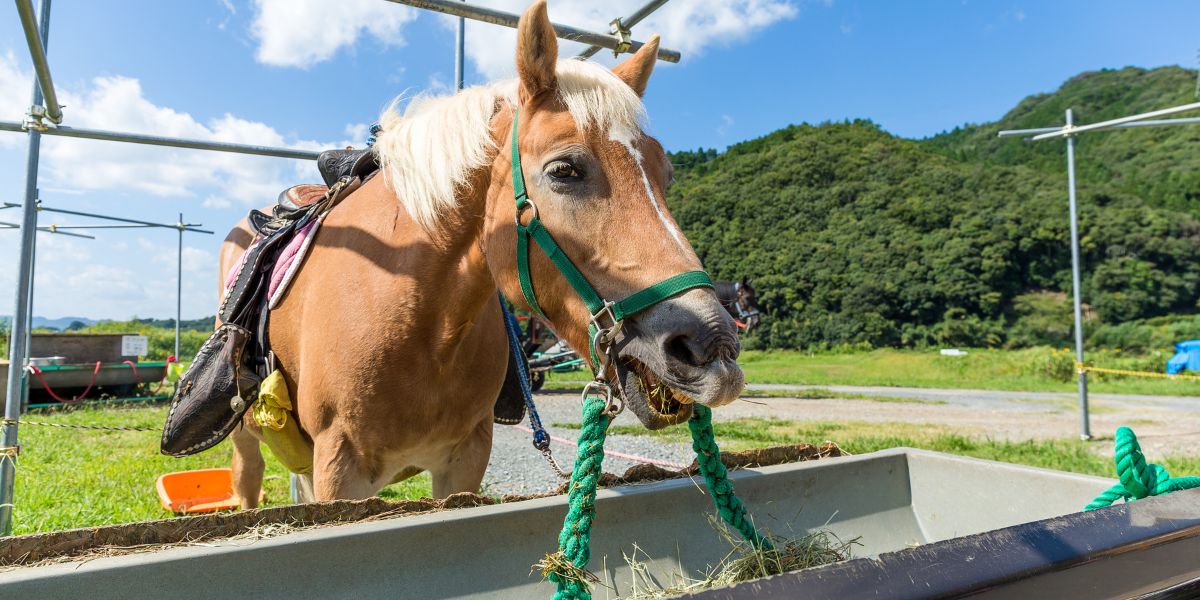
When it comes to the well-being of your equine companion, ensuring they receive the best types of feed and supplements is paramount. The right combination can make a significant difference in their health and performance. But with a multitude of options available, how do you determine what truly suits your horse's unique needs? Let's explore the world of horse nutrition and uncover the secrets to providing your four-legged friend with the optimal diet and supplementation regimen.
Types of Horse Feed
When choosing horse feed, consider the various types available to meet your horse's specific nutritional needs. Start by looking at the primary types: hay, pasture, and concentrates. Hay is a staple in a horse's diet, providing essential fiber and nutrients. Pasture grazing allows for natural foraging, but you must ensure it meets your horse's nutritional requirements. Concentrates like grains or pellets offer a more concentrated source of energy and protein, ideal for horses with higher energy demands.
Within concentrates, there are different options tailored to specific needs. For example, sweet feed contains molasses for palatability, while textured feed includes various grains. Pelleted feed offers a more uniform mix, reducing selective feeding. Consider your horse's age, activity level, and health conditions when choosing the right type of feed.
It's essential to consult with a veterinarian or equine nutritionist to determine the best option for your horse's individual needs. By selecting the appropriate feed type, you can ensure your horse receives the necessary nutrients for optimal health and performance.
Essential Nutritional Supplements
To enhance your horse's overall health and performance, consider incorporating key nutritional supplements into its diet regimen. Essential supplements like omega-3 fatty acids can support joint health and reduce inflammation, benefiting your horse's mobility and comfort. Probiotics are another crucial supplement that aids in digestion, maintaining a healthy gut flora balance. This can lead to improved nutrient absorption and overall well-being for your horse.
Vitamins and minerals are vital for your horse's health, with deficiencies potentially leading to various health issues. Ensure your horse receives adequate amounts of essential vitamins such as vitamin E and B-complex vitamins. Additionally, minerals like calcium, phosphorus, and magnesium play a crucial role in maintaining strong bones, muscle function, and overall metabolic processes.
When choosing nutritional supplements for your horse, consult with a veterinarian or equine nutritionist to determine the specific needs of your horse based on factors like age, activity level, and any existing health conditions. Proper supplementation can complement your horse's diet and contribute to its overall health and performance.
Choosing the Right Hay
Consider carefully selecting the right hay for your horse's nutritional needs to ensure optimal health and performance. Hay is a crucial component of a horse's diet, providing essential fiber, nutrients, and promoting digestive health. When choosing hay, opt for good quality grass or legume hay, such as timothy, orchard grass, or alfalfa. These hays are rich in vitamins, minerals, and protein, supporting your horse's overall well-being.
It's important to assess your horse's individual requirements when selecting hay. Horses with higher energy needs may benefit from alfalfa hay due to its higher protein and calorie content. On the other hand, horses that are easy keepers or prone to obesity might do better on a grass hay like timothy, which is lower in calories. Additionally, consider factors like your horse's age, activity level, and any health conditions when deciding on the type of hay to feed.
Regularly monitor your horse's condition and adjust the hay type or amount as needed to ensure they're receiving the proper nutrition for optimal health and performance.
Benefits of Protein Supplements
Assess your horse's protein requirements to determine the potential benefits of incorporating protein supplements into its diet. Protein is essential for muscle development, tissue repair, and overall health in horses. If your horse is in heavy training, pregnant, nursing, growing, or recovering from an injury, it may require additional protein to support these increased needs.
Protein supplements can help ensure that your horse is getting an adequate amount of this crucial nutrient. They can aid in muscle growth and repair, improve recovery time after intense workouts, and support overall performance. Additionally, protein supplements can be beneficial for older horses that may have difficulty maintaining muscle mass.
When choosing a protein supplement for your horse, opt for high-quality sources such as soybean meal, alfalfa, or whey protein. Make sure to follow the recommended feeding guidelines to avoid overloading your horse with protein, which can lead to health issues. By meeting your horse's protein requirements through supplements, you can help promote its well-being and performance.
Importance of Vitamins and Minerals
Ensure your horse's optimal health and performance by understanding the vital role that vitamins and minerals play in its diet. Just like humans, horses require a balanced intake of essential vitamins and minerals to support various bodily functions. Vitamins such as A, D, E, and K are crucial for overall health, immune function, and proper growth. Minerals like calcium, phosphorus, magnesium, and selenium are essential for strong bones, muscle function, and energy metabolism.
Vitamins and minerals are often found naturally in good-quality forage, but factors like soil quality and processing methods can affect their levels. Supplementing your horse's diet with a balanced vitamin and mineral supplement can help fill any nutritional gaps and ensure they're meeting their requirements. Be cautious not to over-supplement, as excessive amounts of certain vitamins and minerals can be harmful.
Consulting with a veterinarian or equine nutritionist can assist in developing a tailored nutrition plan that meets your horse's specific needs for vitamins and minerals. Remember, a well-rounded diet rich in essential nutrients is key to keeping your horse healthy and thriving.




